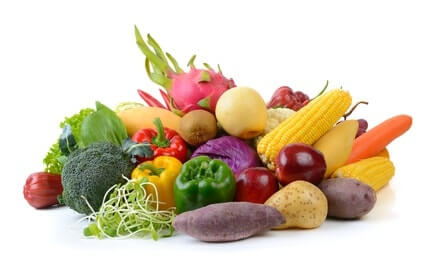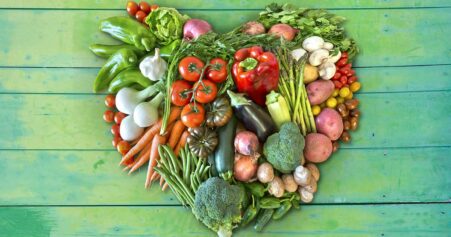Table of Contents
Alimentary Adiposity: How Can a Vegan Diet Help with Adiposity?
The number of overweight people is increasing worldwide, in Germany more than 60 % of adults and 16 % of children and adolescents are affected by overweight or obesity (DAB, 2022). The WHO speaks of an epidemic health problem because excess pounds are usually a harbinger of very serious diseases. It is necessary to find good methods to reduce existing overweight, but above all to take preventive measures. But what are the causes? What are the risks? Is alimentary adiposity the most common form? (How) can a vegan diet help with obesity? This article is all about obesity, including a table with facts and figures.
Did You Know…
……that 13 percent of deaths in the WHO European Region are due to high BMI (DAG, 2022)?
Overweight and Adiposity: Facts and Figures
Adiposity is characterized by an excess of fat tissue in the body. The term obesity is defined as pathologically elevated excess weight and is considered a chronic medical condition. The global population is in the midst of an epidemic of excess fat associated with widespread medical conditions (MVZ, 2017). Most importantly, globally, for the first time, the number of people who are overweight is greater than the number of people who are underweight. Let’s look at some specific data: 1.9 billion overweight people faced 925 million underweight and hungry people in 2016, and the number is rising (WHO, 2021). In Germany, 60.7 % of all men and 46.5 % of women were overweight in 2019, and 19 % of the population is obese, with no gender differences (Eurostat, 2022).
Classification of Overweight and Adiposity
In order to classify overweight and adiposity, the so-called Body Mass Index (BMI) is used. It reflects the relationship between body weight and height and is calculated using a simple formula: body weight [kg]/height [m]2. Whether you are underweight, normal weight, or overweight: Table 1 gives you information about your own BMI.
The BMI classification is based on epidemiological meta-analyses, with normal weight correlating with the highest life expectancy. Both overweight and underweight people have a statistically U-shaped increase in mortality. People with obesity have about five years less life expectancy than people of normal weight (DAG et al., 2014; DAG, 2022).
Overweight – Table 1: BMI Classification of Underweight, Normal Weight, Overweight and Adiposity Classes I – III (WHO, 2004).
| Class | Body-Mass-Index (kg/m2) |
|---|---|
| Underweight | < 18.5 |
| Normal Weight | 18.5 – 24.9 |
| Overweight | 25.0 – 29.9 |
| Adiposity Class I | 30.0 – 34.9 |
| Adiposity Class II | 35.0 – 39.9 |
| Adiposity Class III | > 40.0 |
In addition to excess weight, the distribution of fat plays an important role in the risk of disease. Fat accumulation in the abdominal area is most likely to be a health risk because it is metabolically active and increases the risk of metabolic diseases. So-called abdominal obesity is also part of the metabolic syndrome, which is characterized by four characteristic symptoms: Hypertension, elevated blood lipids, insulin resistance, and abdominal obesity. Table 2 lists the abdominal and waist circumferences in men and women that are associated with an increased and greatly increased risk of metabolic disease.
Obesity – Table 2: Gender-Specific Classification of Waist Circumference (cm) as a Risk Factor for Metabolic Diseases (Hauner et al., 2014).
| Metabolic Risk | Waist Circumference (cm) | |
| Men | Women | |
| Increased | > 94 | > 80 |
| Greatly Increased | > 102 | > 88 |
Causes of Adiposity
The pathologically high weight usually develops slowly but steadily over many years, which is why it is described as a chronic disease. The cause of obesity cannot usually be attributed to a single factor; rather, it is a multifactorial phenomenon based on a number of influencing factors.
 Alimentary adiposity, mainly characterized by excessive food intake, is often considered the primary cause. In most cases, however, a number of concomitant environmental factors play a significant role in the course of the disease. These include lack of exercise, endocrine disorders such as hypothyroidism (underactive thyroid) or Cushing’s syndrome (elevated cortisol levels), the use of certain medications (for example antidepressants or antidiabetics), the shaping of eating behavior at home, the social environment, or even psychological factors such as emotional eating. A genetic component also plays a role (MVZ, 2017). In particular, the wide availability of palatable, energy-dense foods has contributed to the increased prevalence in recent years (DAG, 2022). In addition, epidemiologists can see a correlation between low socioeconomic status and the onset of obesity (Schienkiewitz et al., 2018).
Alimentary adiposity, mainly characterized by excessive food intake, is often considered the primary cause. In most cases, however, a number of concomitant environmental factors play a significant role in the course of the disease. These include lack of exercise, endocrine disorders such as hypothyroidism (underactive thyroid) or Cushing’s syndrome (elevated cortisol levels), the use of certain medications (for example antidepressants or antidiabetics), the shaping of eating behavior at home, the social environment, or even psychological factors such as emotional eating. A genetic component also plays a role (MVZ, 2017). In particular, the wide availability of palatable, energy-dense foods has contributed to the increased prevalence in recent years (DAG, 2022). In addition, epidemiologists can see a correlation between low socioeconomic status and the onset of obesity (Schienkiewitz et al., 2018).
Malnutrition in the social environment and, above all, a lack of exercise are responsible for unwanted weight gain, even at a young age. An interesting scientific finding: the higher the media consumption of children and adolescents, the higher the risk of developing obesity (Havard T.H. Chan).
Many people experience weight gain as they age, especially women during or after menopause. The main reasons for this are a decrease in physical activity, muscle loss due to lack of strength training and protein intake, and hormonal changes.
Sequelae
People with overweight have an increased mortality risk, therefore a shorter life expectancy, than people of normal weight. In addition, obesity can significantly reduce the quality of life by impairing mobility, endurance and performance. A number of sequelae or secondary diseases are associated with increased body weight and abdominal fat accumulation.
The aforementioned metabolic syndrome is often the beginning of other secondary diseases. In the long term, elevated blood pressure and impaired blood lipid levels have the potential to cause vascular disease, such as classic atherosclerosis. Over time, this can lead to cardiovascular disease such as heart failure, stroke or myocardial infarction. People with obesity have twice the risk of these diseases. Insulin resistance can gradually lead to type 2 diabetes mellitus. Elevated uric acid levels provoke gout, and non-alcoholic fatty liver is also promoted by excess food. Excess weight puts a strain on the bones: osteoporosis often occurs at the same time, and obesity increases the risk of at least thirteen types of cancer (DAG, 2022). In addition to the purely physical diseases, psychosocial problems such as depression, lack of self-esteem and social isolation are unfortunately not uncommon, according to recent studies, so that an emotional vicious circle can take its course (Jantaratnotai et al., 2017).
Alimentary Adiposity: Dietary Influence
Alimentary obesity is caused by a person’s diet or eating habits. It is based on a hypercaloric diet. This means that more energy (kcal) is taken in than is used, resulting in weight gain. Foods with high energy density and low fiber content (for example pastries, chocolate bars, chips, but also fats and oils, and nuts), but especially energy-rich beverages such as sodas and juices, promote excessive energy intake. Alcohol is also an energy source that should not be underestimated and can potentially contribute to a hypercaloric diet. The liquid calories are unlikely to induce satiety or may even stimulate appetite (Malik et al., 2006; Traversy and Chaput, 2015).
Poor diet in alimentary obesity often goes hand in hand with a lack of physical activity. According to studies, obese people spend an average of two hours more per day sitting than people of normal weight (Rabast).
When looking at different diets and the average body weight of groups of people, omnivorous eaters tend to have the comparatively highest BMI, followed by ovo-lacto-vegetarians, and in the lowest or normal range according to the BMI classification are people who eat a vegan diet (Tonstad et al., 2009; Spencer et al., 2003).
Treatment of Adiposity With a Vegan Diet![Kalzium vegan]()
The ultimate goal in the treatment of severe obesity is long-term weight stabilization towards a normal BMI. In addition, the physiological and biochemical parameters, such as blood levels, should be brought into the healthy reference range. For this purpose, integrative therapy methods are usually used, which mainly focus on the patient’s lifestyle. These include nutritional, exercise, and behavioral therapies; in many cases, psychological support is also very helpful.
If the overweight is very pronounced, that means at least “obesity class II” (BMI > 35), and if there are possible concomitant diseases, so-called bariatric surgery can be used. This is a surgical procedure in which a gastric band, gastric bypass or balloon is placed.
First and foremost, however, the focus should be on effective prevention measures. Through education in the form of courses, seminars, workshops, etc., the health threat can be prevented, especially in children and adolescents. Nutritionists play an indispensable role in this and thus have a decisive influence on the future health situation of our society.
A plant-based or vegan diet can contribute to a healthy weight. However, this does not mean that a vegan diet is healthy per se. Only a balanced plant-based diet, taking into account the potentially critical nutrients, will benefit health. On average, plant foods have a low energy density and a very high nutrient density. This can contribute to better satiety and satiation and thus to a healthy weight. When comparing scientific studies, scientists conclude that an energy-reduced and plant-based diet can support weight loss more sustainably than an omnivorous diet (Huang et al., 2015; Selinger et al., 2022).
Summary: Vegan Diet and Adiposity
Unfortunately, we are facing a real epidemic, especially in industrialized and now also in emerging countries: severe obesity is a chronic health problem associated with a series of complications. Alimentary obesity is considered the most common form, which underscores the importance of a reasonable, balanced diet. A plant-based diet, with fewer highly processed products and a focus on critical nutrients, can help you get to your desired weight. But you cannot lose sight of the multifactorial causes. Diet is one thing; overall lifestyle, social environment, possible pre-existing conditions, psychological factors or medications are another.
Preventive work in the form of educational and practical programs at the societal level is definitely a priority. In this way, the chronic weight problem cannot only be alleviated in the present situation, but above all, great suffering can be prevented in future generations.








Leave a Reply